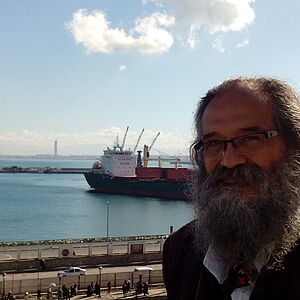
Shahid Rahman
Axes de recherche
Axe Transversal Argumentation
In the last 10 years I have been exploring the main frameworks which lead to shaping my own contribution to the new shift in argumentation studies offered by a novel perspecitve on the Dialogical Framework. Indeed, on one hand I have been delving into the possibilities of extending dialogical pluralism (launched at the Universität des Saarlandes and developed in Lille) ) – see https://plato.stanford.edu/entries/logic-dialogical/.– as a general dialectical stance in relation to the constitution of meaning and logical reasoning (including a plethora of non-classical logics, including normal and non-normal modal logics, temporal logic, connexive logic, relevant logic, logic for fictional and paraconsistent contexts); and on the other I have been doing research on dialectical reasoning patterns in classical Greek, classical Arabic, Jain and Oral African thought. Particular emphasis has been put on n among others, modern and contemporary European Civil Law. The main instrument developed is the dialogical approach to Per Martin Löf’s Constructive Type Theory – the result of this approach, that aims at a dialogical fully interpreted language, carries the name Immanent Reasoning. In fact, this new development in Dialogical logic has its roots in the workshop New Perspectives in Dialogical Logic, that I co-organized with H. Rückert, fostered by the Max-Planck Inst. für Informatik-Saarbrücken. see H. Rückert Dialogues as a Dynamic Framework for Logic. London: College Publications, 2011 (which includes a large number of papers written in collaboration).
These researches yielded several international projects, a large number of publications, about 100 peer-reviewed papers 8 monographies and 15 co-editions of volumes, the supervising of 30 PhD’s (19 since 2011) and involved the edition of 6 collections of books, two very successful collections in Springer. In relation to Springer collections in 2013 I launched as main editor the Springer collection Logic, Argumentation and Reasoning: Perspectives from the Humanities and the Social Sciences (https://www.springer.com/series/11547), and, Logic, Epistemology and the Unity of Sciences, (https://www.springer.com/series/6936) – both became a reference in the field; and four in College Publications, King’s College London – namely: https://www.collegepublications.co.uk/cahiers/, https://www.collegepublications.co.uk/cuadernos/, https://www.collegepublications.co.uk/dialogues/, https://www.collegepublications.co.uk/LS/.
RevLoG. Logic in Reverse
Fallacies in the Arabic, Byzantine, Hebrew and Latin Traditions
CNRS-STL, U. Lille, U. Cambrigde, U. Genève
ERC Synergy Grant.
Le conseil européen de la recherche a annoncé les résultats des « ERC Synergy Grants » 2024. Il s’agit d’importants et prestigieux financements européens pour aider « des groupes de deux à quatre chercheurs exceptionnels à réunir des compétences, des connaissances et des ressources complémentaires dans un projet innovant ». Il a distingué notamment RevLogRedux, co-porté par le professeurs Leone Gazziero (CNRS/STL), Shahid Rahman (faculté des humanités/laboratoire Savoirs, textes, langages – CNRS-STL), Roberta Padlina (U. de Genève) et Tony Street (U. Cambridge).
RevLog est l'une des rares subventions ERC-Synergy Grant allouées à des institutions européennes dans le domaine des sciences humaines. Il s'agit en effet de la première subvention de ce type pour les sciences humaines obtenue par l’Université de Lille, la deuxième ERC-Synergy Grant jamais accordée à l'université de Lille, tous domaines confondus, et aussi la deuxième pour la School of Arts and Humanities de l’université de Cambridge. Le projet subventionné à hauteur de 10 millions d'euros en totale pour ses 6 ans porte sur les arguments fallacieux dans les traditions médiévales (arabe, hébreu, latin et grec).
L'objectif de RevLogR est de fournir une reconstruction COMPLÈTE, FINE, TRANSFERABLE et PORTABLE des théories médiévales des arguments illégitimes. Il s'agit de la première étude de ce type : « COMPLÈTE » parce qu'elle couvrira l'éventail complet des quatre traditions. « FINE » en ce sens qu'il prendra en compte les aspects culturels et contextuels de la littérature qu'il étudiera. « TRANSFERABLE », car il jettera les bases d'un examen croisé des normes médiévales et contemporaines de raisonnement fallacieux, sur la base d'analyses philologiques, herméneutiques et dia-logiques. « PORTABLE », car il partagera ses ressources sur le web grâce à ASKSTEN, l'infrastructure numérique ouverte et extensible du projet. Les résultats seront également progressivement mis à la disposition d'un public plus large par le biais d'une encyclopédie axée sur les débats concernant les normes des arguments légitimes et illégitimes.



